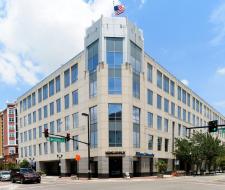Higher education in Orlando, FL 2026
This content was developed and approved with active participation of Sam Jones.
In the process of preparing the material, we referenced the following sources:
- https://en.m.wikipedia.org/wiki/Education_in_Florida
- https://www.communitycollegereview.com/florida/orlando
-
 from 28590.00 $ / year
from 28590.00 $ / year -
 from 8500.00 $ / semester
from 8500.00 $ / semester -
 from 27600.00 $ / year
from 27600.00 $ / year -
 #6 out of 136 Regional Universities South
#6 out of 136 Regional Universities South USAOrlando, FLCurrently watching: 4from 20000.00 $ / year
USAOrlando, FLCurrently watching: 4from 20000.00 $ / year -
 #236 out of 439 National Universities
#236 out of 439 National Universities USAOrlando, FLCurrently watching: 3from 20000.00 $ / year
USAOrlando, FLCurrently watching: 3from 20000.00 $ / year -
 from 33100.00 $ / year
from 33100.00 $ / year -
 from 21683.00 $ / year
from 21683.00 $ / year -

-
 #53 out of 439 National Universities
#53 out of 439 National Universities USAOrlando, FLCurrently watching: 2from 32782.00 $ / year
USAOrlando, FLCurrently watching: 2from 32782.00 $ / year -
 #170 out of 439 National Universities
#170 out of 439 National Universities USAOrlando, FLCurrently watching: 1from 15000.00 $ / year
USAOrlando, FLCurrently watching: 1from 15000.00 $ / year
A lot of young international people are going overseas for the "American dream". The opportunity to get a higher education in England or the USA is provided to everyone who is ready to invest in their own future - universities are open to foreign applicants, they are, in fact, international.
Higher education, like secondary education in the USA, has several distinctive features that attract foreign students:
- An exceptional quality of education. It is in US universities that 75% of modern Nobel laureates, practicing scientists and businessmen teach;
- 78 American universities are among the world's TOP;
- Social and legal protection of foreign students;
- High-quality medical care;
- Comfortable accommodation conditions;
- In addition to educational process, students are provided with optimal conditions for creative, physical development;
- Educational campuses have all the necessary infrastructure.
An important factor in pursuing higher education in the United States is a prospective student's ability to adjust to life in the country and to immerse themselves in the local traditions and customs. Consequently, foreign students require help in navigating the application process for U.S. universities and additional insights into preparatory educational programs. Careful consideration must be given when deciding on a pre-university preparation program in the U.S., as institutions in Orlando have various requirements for foreign students. While higher education in the U.S. is accessible to international citizens, it comes with some specific characteristics.
Alternative destinations
Higher education in Orlando. Guide for international students
Higher education in Orlando presents an array of prospects for foreign students aiming to explore various fields of study. This educational framework consists of institutions categorized into four types, each designed to meet the academic goals of students worldwide. They include universities with multiple colleges offering bachelor’s, master’s, and doctoral degrees. Furthermore, non-university colleges are also open to foreign students.
Bachelor’s degree programs typically require four years to complete, while vocational institutions provide options lasting from six months to four years. Community colleges focus on training skilled professionals, allowing students to transfer to traditional four-year institutions after two years.
Prestigious and Sought-After Specialties
When considering the most prestigious, competitive, and costly specialties in the United States, several stand out: law, IT technology, medicine, music education, and all fields associated with business and finance.
Understanding the Academic Year
The concept of an "academic year" is universally recognized in foreign educational systems, including the United States. However, its duration and division into segments can also vary among different establishments. In the U.S., the educational year typically commences in late August or early September and concludes in late May or early June. Unlike international universities, which divide the academic year into two semesters, the U.S. system includes the option for 3 periods (trimesters) or even 4 quarters.
Benefits of Higher Education in Orlando
The U.S. education system employs a completely unique technique to evaluate student process in higher education. To successfully complete an educational program or earn a degree, students have to gather a specific number of credits. It's noteworthy that each U.S. university establishes its own credit score requirements, without standardized policies governing this factor. Student performance is assessed using a letter-based grading system (from A to E), converted into GPA points (Grade Point Average), represented as numerical values. GPA reflects a student's average overall performance across subjects and frequently plays an essential role in employment possibilities and graduate school admissions. Consequently, many students strive to maintain a GPA above the average threshold.

What firstly should be considered when choosing a university? Subjects, employer value, percentage of employment in the first year after graduation?
It depends on the student - everyone determines the most important criteria for himself. I would advise you to take several rankings and compare them with each other, plus take into account the cost of the course, the location of the university and its scale, the percentage of graduates' employment. See where graduates continue their studies or where they go to work.
Bachelor's and Master's Degree Programs in Orlando
Higher education in Orlando offers foreign students the opportunity to obtain several degrees, with the educational journey unfolding through multiple stages, much like in other countries worldwide.
The Bachelor's degree in the U.S. spans four years and culminates in the attainment of an undergraduate degree. Graduates receive either a Bachelor of Science or a Bachelor of Arts degree. Typically, the bachelor's degree program encompasses around 30 subjects within the chosen field of study. Contrary to prevailing stereotypes, a U.S. bachelor's degree signifies full-fledged higher education, equipping individuals for successful professional careers.
The subsequent academic stage allows international students to pursue a graduate degree and a master's degree, typically spanning two years. The master's degree program aligns with the field of study undertaken during the bachelor's degree program, offering specialized instruction and in-depth exploration of specific subjects. This stage culminates in the preparation and defense of a master's thesis. It's essential to note that master's programs encompass two types:
- Professional programs tailored for careers within a specific profession.
- Academic programs designed for research or postgraduate studies.
Studies and PhD in Orlando
For international students seeking further academic advancement, doctoral studies or a PhD beckons. This stage involves in-depth research and scientific inquiry, somewhat akin to achieving the status of a "candidate of sciences." While the acronym "PhD" harkens to "Doctor of Philosophy," its application extends across various fields of study. Completing this third tier of higher education typically requires four to six years.
Notably, many students enrolled in bachelor's programs commence their university journey by taking foundational, general subjects during the initial 1-2 years. They then transition to their chosen specialty, incorporating specialized courses into their curriculum starting from the third year. This flexible approach eschews rigid and categorical divisions, allowing students to mingle and adapt based on their chosen educational courses.
Subjects in the primary specialization are denoted as "Major," while those in secondary fields of study are referred to as "Minor." The two categories of study need not be related in any way. To make the most informed choice, students are encouraged to explore various courses and thematic classes during their first two years, covering fields such as arts, journalism, computer science, business, management, and more.
Higher education in Orlando. Cost and Fees for Foreign Students
Tuition
Tuition costs can vary widely among different colleges and universities in Orlando. Public institutions often have different rates for in-state and out-of-state students, while private institutions typically have a standard tuition rate.
Fees
Like tuition, fees can vary. These may include technology fees, student activity fees, health services fees, and others. Be sure to check the specific fees associated with your chosen institution and program.
Room and Board
The cost of living, including room and board, can vary depending on whether you choose to live on or off-campus. Some universities offer on-campus housing options with different price points, and off-campus living expenses can vary based on the neighborhood and type of housing.
Books and Supplies
Students should budget for textbooks, supplies, and other academic materials. The cost of books can vary depending on the courses and the college's policies regarding textbooks.
Transportation
Consider transportation costs, especially if you'll be commuting. This includes gas, parking fees, public transportation, or other related expenses.
Miscellaneous Expenses
Students should also budget for miscellaneous expenses, including personal items, entertainment, and other incidentals.
Financial Aid and Scholarships
Explore financial aid options, including federal aid, grants, and scholarships. Many universities offer various forms of financial assistance to help offset the cost of education.
Graduate Programs
If you're considering graduate programs, the cost structure may differ. Some graduate students may have opportunities for assistantships, fellowships, or other forms of financial support.
Learning programs-summary information
| Name | Meaning | Equivalent | Min. age | Duration, years |
Next stage | Cost |
|---|---|---|---|---|---|---|
| GCSE | General certificate of secondary education | secondary education (non-accomplished) | 14 | 1–2 | A-Levels | 15,000 USD+ |
| A-Levels | Advanced level | secondary education (accomplished) | 16 | 2 | University | 15,000 USD+ |
| BTEC | Business and Technology Education Board | secondary special education | 14 | 2–3 | University/ work | 15,000 USD+ |
| Oxbridge Preparation | Preparing for Oxford and Cambridge | secondary education (accomplished) | 17 | 1 | University | 15,000 USD+ |
| International Baccalaureate | International baccalaureate | secondary education (accomplished) | 16 | 2 | University | 18,000 USD+ |
| Foundation/ Pathway Year | Preparatory year | admission to the 1st year of university | 17 | 1 | University | 14,000 USD+ |
| NCUK | The Northern consortium | 2 year university | 17,5 | 1 | 2 year University of NCUK | 13,000 USD+ |
| Special Preparation (Medics/Math/Business) | Specialized training | - | 14 | optional | optional | 4,000 USD+ |
| Academic English | Academic English | Language school | 8 + | 6–12 months | School or University | 8,000 USD+ |
Top 14 best universities in Switzerland 2026
| 1 | Glion Institute of Higher Education Switzerland |
| 2 | Les Roches International School Montana |
| 3 | César Ritz Colleges Switzerland |
| 4 | IHTTI School of Hotel Management |
| 5 | Ecole Hoteliere de Lausanne |
| 6 | Geneva Business School |
| 7 | HIM Hotel Institute Montreux |
| 8 | Swiss Hotel Management School |
| 9 | Webster University Geneva |
| 10 | Business and Hotel Management School |
| 11 | Luzern IMI |
| 12 | Swiss Hotel Management School (SHMS) Caux |
| 13 | International University in Geneva |
| 14 | Culinary Arts Academy Switzerland |
